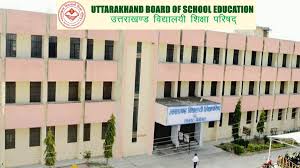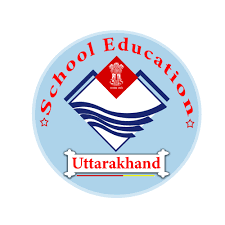
School Education, Uttarakhand

ADDRESS:
Directorate of School Education
Nanoorkhera, Tapovan Road,
Dehradun, Uttarakhand 248001, India.
Description:
The Office of School Instruction in Uttarakhand is committed to giving quality instruction to understudies over the state, including essential, auxiliary, and higher auxiliary levels. Set up to supervise and upgrade the instructive system, the office points to guarantee open, impartial, and quality instruction for all children in Uttarakhand.
Historical Background
Uttarakhand, since its arrangement in 2000, has set critical accentuation on instruction as a implies of socio-economic improvement. The Division of School Instruction was set up to address the special instructive challenges of the state, counting its differing topography and statistic conveyance. Over the a long time, the office has executed different approaches and programs to make strides proficiency rates and instructive outcomes.
Organizational Structure
The Office of School Instruction works beneath the direction of the Service of Instruction, Government of Uttarakhand. Its organizational structure includes:
Directorate of School Instruction: Dependable for the by and large organization and administration of school instruction in the state.
State Chamber of Instructive Inquire about and Preparing (SCERT): Centers on educational programs advancement, instructor preparing, and instructive research.
Uttarakhand Board of School Instruction (UBSE): Conducts examinations and supervises the usage of instructive approaches at the school level.
District Instruction Workplaces: Oversee instructive exercises and programs at the area level, guaranteeing compelling execution of policies.
Key Activities and Programs
The division has propelled a few activities to improve the quality of education:
Samagra Shiksha Abhiyan: A comprehensive program pointed at the universalization of school instruction, joining plans like Sarva Shiksha Abhiyan (SSA), Rashtriya Madhyamik Shiksha Abhiyan (RMSA), and Educator Education.
Mid-Day Supper Plot: Gives nutritious dinners to understudies in essential and upper essential schools to move forward enrollment, maintenance, and attendance.
Digital Instruction: Usage of Data and Communication Innovation (ICT) in schools to advance advanced education among understudies and teachers.
Inclusive Instruction: Programs to back the instruction of children with extraordinary needs, guaranteeing they get fitting assets and support.
Curriculum and Pedagogy
The educational programs is planned to be all encompassing, centering on the cognitive, enthusiastic, and social improvement of understudies. It includes:
Core Subjects: Dialects, Science, Science, and Social Studies.
Co-curricular Exercises: Expressions, Physical Instruction, and Life Abilities to advance by and large development.
Vocational Instruction: Courses pointed at ability improvement to upgrade employability.
Pedagogical approaches emphasize intuitively and student-centered learning, empowering basic considering and problem-solving skills.
Teacher Preparing and Development
Recognizing the essential part of instructors, the office contributes in their persistent proficient improvement through:
In-Service Preparing Programs: Customary workshops and courses to upgrade instructors on the most recent instructive hones and methodologies.
Pre-Service Preparing: Instructor instruction programs to get ready future teachers with the vital aptitudes and knowledge.
Mentorship Programs: Experienced teachers guide unused instructors, giving direction and support.
Assessment and Evaluation
The office utilizes a comprehensive assessment framework to evaluate understudy learning outcomes:
Formative Appraisals: Nonstop appraisals through tests, assignments, and course cooperation to screen progress.
Summative Evaluations: End-of-term examinations to assess by and large understanding and proficiency.
Board Examinations: Conducted by UBSE for auxiliary and higher auxiliary levels to certify understudy achievement.
Infrastructure Development
Efforts are made to progress the physical foundation of schools, particularly in farther areas:
Construction of Classrooms: Building unused classrooms to oblige expanding understudy numbers.
Provision of Essential Conveniences: Guaranteeing accessibility of clean drinking water, sanitation offices, and electricity.
Library and Research facility Offices: Setting up well-equipped libraries and science research facilities to upgrade learning experiences.
Community and Parental Involvement
The division empowers dynamic interest of guardians and the community in the instructive process:
School Administration Committees (SMCs): Including guardians and community individuals in school administration and decision-making.
Parent-Teacher Gatherings: Normal intuitive to examine understudy advance and address concerns.
Community Outreach Programs: Activities to raise mindfulness around the significance of instruction and empower community support.
Challenges and Future Directions
Despite noteworthy advance, the office faces challenges such as:
Geographical Obstructions: Troublesome territory in sloping locales hampers get to to education.
Teacher Deficiency: Require for qualified instructors, especially in inaccessible areas.
Infrastructure Holes: Guaranteeing all schools have satisfactory facilities.
To address these challenges, the office plans to:
Enhance Computerized Instruction: Leveraging innovation to reach underserved areas.
Strengthen Educator Enlistment and Preparing: Pulling in and holding qualified teachers through motivations and proficient development.
Improve Observing and Assessment: Actualizing strong frameworks to track advance and distinguish zones for improvement.
In conclusion, the Office of School Instruction in Uttarakhand is committed to giving quality instruction to all children in the state. Through different activities and programs, it endeavors to overcome challenges and make an comprehensive, evenhanded, and successful instructive environment.
